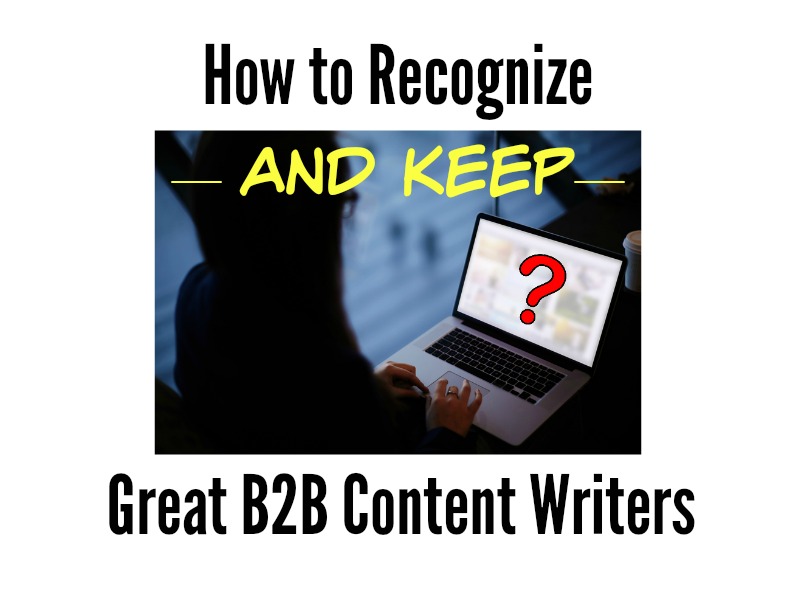
Great B2B content writers are a dime a dozen, right?
Hardly.
If you’re an experienced content marketer, you know how hard it is to find good writing talent. I hear this from my clients time and again. Sure, there are oodles of people out there selling their writing services. That doesn’t mean they’re great at it. Or even passable.
Truth is, far too many B2B content writers fall short of their clients’ expectations. Maybe you’ve experienced one or more of these firsthand.
- Writers who turn in sloppy, error-filled work.
- Writers who don’t respond to inquiries or requests in a timely fashion.
- Writers who bristle at criticism.
- Writers who can’t seem to grasp (or seem disinterested in) a company’s unique value proposition, its industry, its target audience, or the point of the project.
- Writers who can’t (or won’t) adapt to unfamiliar channels, tools, workflows, or demands.
- Writers who just can’t tell a good story.
Don’t you wish you could identify top B2B content writers right off the bat?
Actually, you can. You just need to look for signs of a great writer (as well as red flags that indicate the opposite).
And—more importantly—once you have great writers in the door, you must help them succeed and give them a reason to stick around.
Here’s how.
6 Signs of Greatness
Great B2B content writers have diverse backgrounds. But they all share a profound dedication to their clients and their profession. Here’s how those attributes shine through.
- Diverse portfolio. A wide range of work—across industry verticals and/or funnel stages—demonstrates versatility and adaptability.
- An outstanding website. Flashy design or no, it should be clear, concise, attractive, and user friendly. Ideally, you’ll find compelling client testimonials there.
- Professional, polished, letter-perfect communications. Just what you’d expect from someone who lives and dies by the English language (and its correct usage).
- Complete honesty. Great writers are candid about their experience (or lack thereof) in a particular area. That’s because they don’t want to commit to anything they can’t truly deliver. Writers worth their salt aren’t interested in shoehorning something in, and winging it, just to maximize income.
- Obvious interest in your company and brand. When you first reached out to them, did they do their homework? Visit your site? Check out your portfolio? Read your blog? Follow you on social media channels? You’ll know they’re into you if they bring up interesting facts or project work that resonated with them or piqued their interest.
- Ongoing pursuit of knowledge. Do they have any industry certifications? Are they curating content for their social media communities? Do their blogs reflect an awareness and deeper consideration of salient topics? Great B2B content writers are avid students of marketing, business, and life.
4 Red Flags You Can’t Ignore
I’d be leery of any writer who exhibits the following.
- Poor online presence. An amateurish website and little or no social media presence spells trouble. Particularly for a writer who supposedly specializes in content.
- Sloppy and/or spotty communications. Writers who don’t correspond professionally, or in a timely way, are like people who show up late to interviews wearing tuxedo t-shirts. It’s hard to take them seriously. I wouldn’t.
- Jack of all trades, master of none. Claiming they know it all, have done it all, and can do it all, with no particular niche or specialty area. This indicates one of two things: 1) They’re overselling (and will surely under deliver); or 2) they haven’t worked enough in a particular area to master it.
- Rock-bottom prices. At best, this one smacks of desperation. Great writers charge what they know they’re worth. (One caveat: Negotiation based on the particulars of a job or an extended working relationship is never out of the question.)
What Your Writers Need From You
Great B2B content writers won’t stick around if there’s no incentive. You have to treat them like the hardcore professionals they are. Impersonal transactions don’t interest them; they want to partner with you on a strategic level.
Here’s how to build a lasting partnership that will benefit you both.
- Regular, responsive communication. This one is huge. Seems like common sense, right? Not for all organizations. I’ve experienced radio silence myself, and it’s incredibly frustrating and demeaning. Ignoring your writers is the fastest way to slough them off.
- Proper guidance. You need to convey everything you know and understand about the job (and the context for it). Great B2B writers can’t perform at their peak without the right tools. They need both the finer details and a lay of the land.
- Commensurate pay. Great B2B writers deliver results. When that happens, consider a rate increase. It will serve as a reward for good work—and a sign of how much you value your writers and their contributions.
Bottom Line: Vet Them Well, Treat Them Even Better
If you outsource content writing, you need to screen your writers carefully. And you need to treat them like true, valued partners. You have to do both to get the results you want—and to avoid the constant scramble to locate new writing talent.
What kinds of experiences have you had with freelance B2B content writers (good and bad)? How do you screen new writers, and how do you solidify your relationship with them? Please share your thoughts below.

Since 2001, Becky Tumidolsky has written awareness-building content for B2B brands and their discerning audiences. Her work has appeared in leading publications such as Forbes, U.S.News & World Report, Bloomberg Markets, Newsweek, and Inc. as well as corporate blogs, websites, white papers, and other content assets.
Becky loves writing fluid, error-free prose. She’s even more passionate about building the foundation for her work—uncovering core brand distinctions, framing them thematically, and developing fresh, compelling narratives that advance corporate strategies.
Follow and connect: Twitter| Google+| LinkedIn| Facebook





Leave a Reply